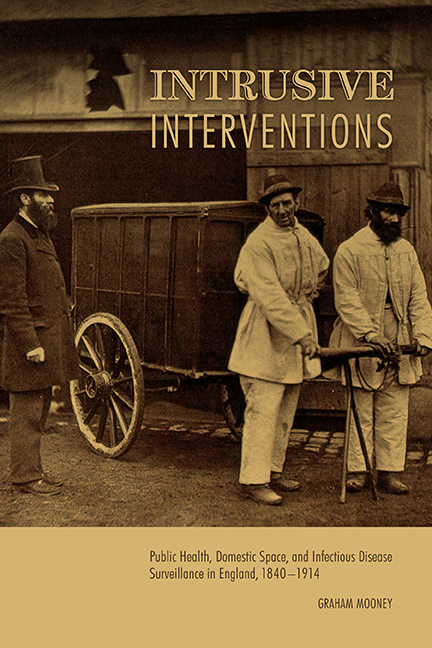 Intrusive Interventions
Intrusive Interventions Book contents
- Frontmatter
- Dedication
- Contents
- Acknowledgments
- Abbreviations
- Introduction
- Part One Making Infectious Disease Surveillance
- Part Two Spaces of Risk and Opportunity
- 3 Sequestration and Permeability: Isolation Hospitals
- 4 “Combustible Material”: Classrooms, Contact Tracing, and Following-Up
- 5 Disinfection, Domestic Space, and the Laboratory
- 6 Rules for Home Living: Tuberculosis and the Consumption of Self-Help
- Conclusion
- Notes
- Bibliography
- Index
4 - “Combustible Material”: Classrooms, Contact Tracing, and Following-Up
from Part Two - Spaces of Risk and Opportunity
Published online by Cambridge University Press: 14 March 2018
- Frontmatter
- Dedication
- Contents
- Acknowledgments
- Abbreviations
- Introduction
- Part One Making Infectious Disease Surveillance
- Part Two Spaces of Risk and Opportunity
- 3 Sequestration and Permeability: Isolation Hospitals
- 4 “Combustible Material”: Classrooms, Contact Tracing, and Following-Up
- 5 Disinfection, Domestic Space, and the Laboratory
- 6 Rules for Home Living: Tuberculosis and the Consumption of Self-Help
- Conclusion
- Notes
- Bibliography
- Index
Summary
It has long been argued that the introduction of elementary schooling in 1870 shaped the identity of the English working classes by reinforcing their station in the social hierarchy. Strict discipline, obedience, and the maintenance of order were the foundations of moral reformation and spiritual salvation that drove the mid-nineteenth-century creed of social obligation. The curriculum in elementary schools came to be heavily influenced by ideas about national identity and imperialism, particularly against the background of national decline in the 1890s and 1900s. The economic threat posed by Germany and the worrisomephysical condition of Anglo-Boer War recruits prompted a reshaping of the Board of Education and the elementary school system in the early twentieth century under the rubric of “national efficiency.”
Family and domestic space were accorded privileged status in elementary school reading books in the early twentieth century. According to historian Stephen Heathorn, the campaign of “national efficiency” urgently promulgated a sense of Englishness. The English idea of home, Heathorn says, “implied both a sense of natural order and a genealogical and historical rootedness.” A stable and structured ordering of home and familial relations was scaled up to represent the nation as an extended family and a web of obligations. Domestic femininity, Heathorn argues, was posited as the natural foil to civic masculinity: “The professional middle-class construction and projection of an idealized femininity and its association with ‘traditional’ domesticity and motherhood should be considered as a correlative to the fabrication of the active, worldly, and virile imperial-nationalist masculinity evident in the understanding of ‘good citizenship’.” Competent and effective child rearing became a national duty, not just a moral one.
As we have seen, earlier in the nineteenth century the middle-class ideal of domesticity was a foundation for social morality, electoral reform, political participation, and public health intervention. The dominant model of the nuclear family was based on the notion that the moral and spiritual values of women held sway, though financial security and decision making ultimately lay in the hands of the male head of household. By the end of the century, however, the complexion of this domestic symbiosis was changing.
- Type
- Chapter
- Information
- Intrusive InterventionsPublic Health, Domestic Space, and Infectious Disease Surveillance in England, 1840-1914, pp. 93 - 120Publisher: Boydell & BrewerPrint publication year: 2015


